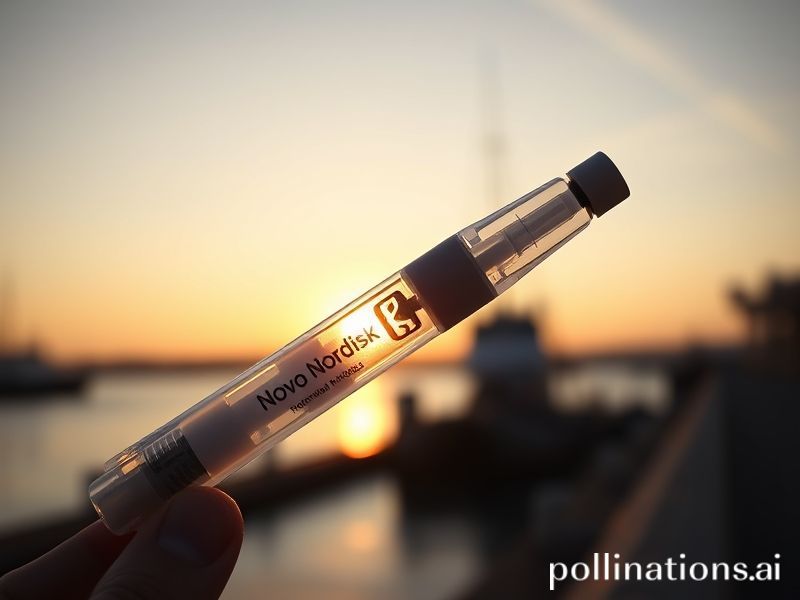Novo Nordisk: How a Danish Pharma Giant Became the Shadow Superpower of Global Gluttony
Somewhere between the Arctic Circle and a midtown Manhattan pharmacy counter, the Danish firm Novo Nordisk has quietly become the most influential geopolitical actor nobody voted for. What began in 1923 as a modest insulin cooperative in a Copenhagen loft has metastasized—appropriately—into a global empire whose market cap now exceeds the GDP of oil-rich Norway. If you find it odd that a company selling appetite suppressants now moves currency markets, welcome to late-stage capitalism where the cure for gluttony is more valuable than the stuff we glut ourselves on.
Novo’s twin darlings, Ozempic and Wegovy (same molecule, different marketing budgets), have achieved the rare feat of uniting Washington lobbyists, Gulf sovereign-wealth funds, and TikTok diet gurus in one rapturous chorus. From Riyadh’s marble clinics to São Paulo’s favela pharmacies, the weekly injection has become a status symbol more potent than a Gulfstream keychain. Saudi royals reportedly charter refrigerated jets to ensure their pens don’t spoil; meanwhile, in South Africa, counterfeit versions—brewed, one presumes, in someone’s bathtub—sell for half the monthly minimum wage. The global south gets knock-offs and moral panic; the global north gets beach bodies and stock buybacks. Balance restored.
The numbers are so cartoonish they feel satirical. Novo’s revenue jumped 36% last year, driven almost entirely by Americans who discovered that the fastest route to a thigh gap is a Danish syringe. The firm now bankrolls 60% of Denmark’s entire current-account surplus, a fact that causes both national pride and quiet terror in Copenhagen’s finance ministry. Picture Viking descendants nervously pacing parquet floors, praying Americans stay hungry—figuratively, of course.
But every empire exports chaos along with miracle cures. Egypt, already wrestling with a 40% currency devaluation, just restricted GLP-1 drug exports because affluent Europeans were siphoning off supplies meant for diabetics. Lebanon’s central bank briefly considered using remaining dollar reserves to import weight-loss meds, reasoning that a thinner population eats less imported food and thus eases the trade deficit—a fiscal diet plan that would make Kafka blush. Meanwhile, EU health ministers convene emergency Zooms to debate whether treating vanity is a legitimate use of public funds. The answer, whispered between spreadsheets, is usually “yes, if it keeps voters photogenic.”
Behind the scenes, Novo plays the geopolitical chessboard like a bored grandmaster. When the Biden administration muttered about price caps, the company delicately reminded Congress that its new $4 billion North Carolina facility could relocate to, say, Poland—where the workforce is skilled and the politicians grateful. Overnight, congressional interest evaporated faster than a supermodel’s lunch. In Brussels, regulators wag fingers about shortages, then quietly approve pediatric trials because, well, childhood obesity is a “public-health emergency.” Nothing says urgency like expanding your addressable market to eight-year-olds.
And yet, the firm’s greatest trick is convincing the world that biological destiny can be rented weekly at 900 USD a pop. Side effects? Oh, just a smidge of gastroparesis and the occasional suicidal ideation—small print in a font size usually reserved for genocides. Still, the promise of transcendence sells itself. From Seoul’s Gangnam clinics where K-pop trainees line up for injections between dance rehearsals, to London hedge-fund canteens where partners now skip the breadbasket because their pancreas is doing the Lord’s work, humanity has agreed on one universal truth: we’d rather jab ourselves with hormones than confront why we’re eating our feelings in the first place.
Novo Nordisk, then, is not merely a pharmaceutical company; it is the mirror our bloated planet deserves—reflecting back a species so affluent it medicates itself out of abundance, so vain it outsources willpower to a lab in Bagsværd. The Danes, ever polite, simply took our weakness, wrapped it in a prefilled pen, and mailed us the invoice. And because we’re creatures of appetite, we tipped generously.







